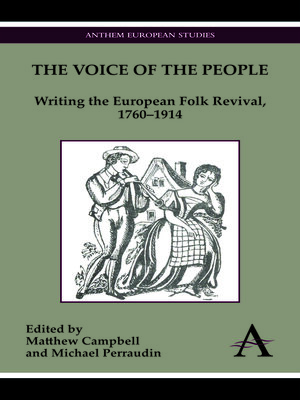The Voice of the People
ebook ∣ Writing the European Folk Revival, 1760–1914 · Anthem European Studies
By Matthew Campbell

Sign up to save your library
With an OverDrive account, you can save your favorite libraries for at-a-glance information about availability. Find out more about OverDrive accounts.
Find this title in Libby, the library reading app by OverDrive.



Search for a digital library with this title
Title found at these libraries:
| Library Name | Distance |
|---|---|
| Loading... |
'The Voice of the People' presents a series of essays on literary aspects of the European folk revival of the eighteenth and nineteenth centuries, and focuses on two key practices of antiquarianism: the role that collecting and editing played in the formation of ethnological study in the European academy; and the business of publishing and editing, which produced many 'folkloric' texts of dubious authenticity. The volume also presents new readings of various genres, including the epic, song, tale and novel, and contributes to the study of several crucial European literary figures. Above all, it investigates the great anonymous authors of the European folk tradition – in narrative and lyric art – and their relation to the cultural movements and imagined identities of the peoples of the emerging nineteenth-century European nation.
|'The Voice of the People' presents a series of essays on literary aspects of the European folk revival through the eighteenth and nineteenth centuries. Its approach is both topical and generic, addressing not just the question of what purposes the folk revival served but also its many forms and genres. It focuses on two practices of antiquarianism, namely the key role that collecting and editing played in the formation of ethnological study in the European academy, and the business of publishing and editing that produced many 'folkloric' texts of dubious authenticity. Collecting and editing went hand-in-hand with plagiarism and forgery in the practice of many: much English, Scottish and Irish folk-song is of late-eighteenth century literary origin. Across Europe, too, national literary identities were often based on origins supposedly discovered in the people, but which were frequently the stuff of fiction. As was the case with Russian and Czech folklore, an interest in the folkloric was often successfully hybridised, with, for example, a continuing emphasis on classical patterns instructing the creation of vernacular art forms. In Germany, debate about the folk served the purposes of a radical writing in a time of successive political upheavals.
In addition to exploring these tendencies, 'The Voice of the People' also presents readings of various genres: epic, song, tale and novel. It contributes to the study of several crucial European literary figures, from Macpherson and Percy, Herder and Burns, to Heine, Pushkin, Moore and Morris. But most of all it concerns the great anonymous authors of the European folk tradition – in narrative and lyric art – and their relation to the cultural movements and imagined identities of the peoples of the emerging nineteenth-century European nation.
'The Voice of the People' offers an original take on folklore revivals through its attempt to integrate British examples of the literary and antiquarian uses of folk art with a strong account of comparable movements in Europe.







